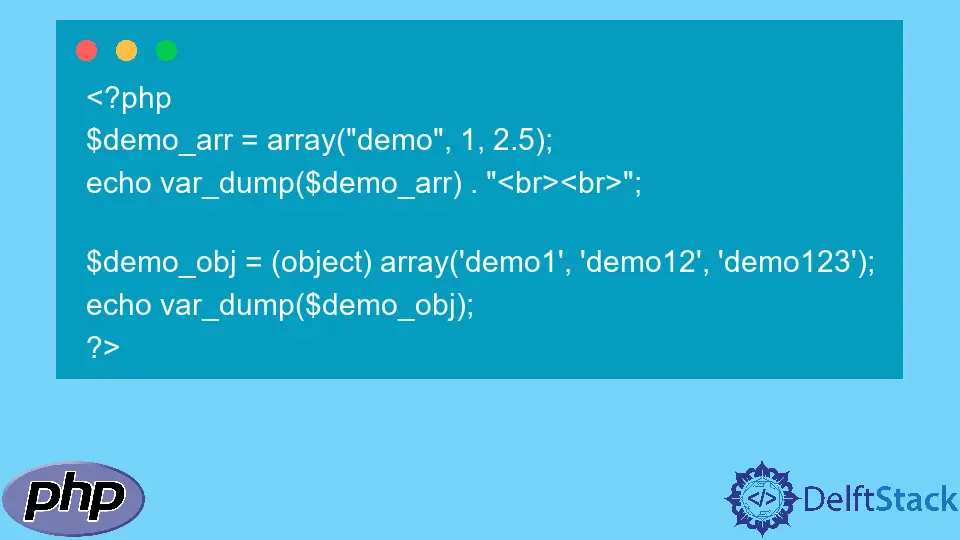var_dump() PHP Built-In Function
- What is var_dump()?
- Basic Usage of var_dump()
- Displaying Information About Different Variable Types
- Using var_dump() for Debugging
- Best Practices for Using var_dump()
- Conclusion
- FAQ

When working with PHP, one of the most useful built-in functions is var_dump(). This function is particularly handy for developers who need to debug their code or understand the structure of variables.
In this tutorial, we will explore how var_dump() can display detailed information about a variable, including its type and value. Whether you’re a beginner or an experienced developer, mastering this function can significantly enhance your PHP debugging skills. Let’s dive into the world of var_dump() and see how it can simplify your coding experience.
What is var_dump()?
The var_dump() function in PHP is used to display structured information about one or more variables. This includes the type of the variable, its value, and, if applicable, the value of its elements. Unlike other functions like print_r(), var_dump() provides much more detailed information, making it an essential tool for developers who need to inspect variable contents closely.
For example, if you have an array or an object, var_dump() will reveal the internal structure, which can help you identify issues in your code more effectively. This function is particularly useful in debugging scenarios where understanding variable types and values is crucial.
Basic Usage of var_dump()
Using var_dump() is straightforward. You simply pass the variable you want to inspect as an argument. Here’s a simple example to illustrate its usage:
$variable = array("apple", "banana", "cherry");
var_dump($variable);
Output:
array(3) {
[0] => string(5) "apple"
[1] => string(6) "banana"
[2] => string(6) "cherry"
}
In this example, we declare an array containing three fruit names. When we call var_dump($variable), it outputs the type of the variable (array), the number of elements (3), and each element’s type and value. This level of detail is invaluable for debugging complex applications.
Displaying Information About Different Variable Types
var_dump() works with various data types, including strings, integers, arrays, and objects. Let’s look at how it behaves with different types of variables.
$string = "Hello, World!";
$integer = 42;
$array = array("foo", "bar", "baz");
$object = (object) ["name" => "John", "age" => 30];
var_dump($string);
var_dump($integer);
var_dump($array);
var_dump($object);
Output:
string(13) "Hello, World!"
int(42)
array(3) {
[0] => string(3) "foo"
[1] => string(3) "bar"
[2] => string(3) "baz"
}
object(stdClass)#1 (2) {
["name"] => string(4) "John"
["age"] => int(30)
}
In this example, we define a string, an integer, an array, and an object. Each call to var_dump() provides detailed information about the type and value of each variable. This is particularly useful when you’re unsure of the variable’s type or structure, allowing you to troubleshoot issues quickly.
Using var_dump() for Debugging
One of the primary reasons developers use var_dump() is for debugging purposes. When your application isn’t behaving as expected, inspecting variable contents can help you pinpoint where things might be going wrong.
Consider a situation where you’re working with user input. You might want to verify that the data is being captured correctly. Here’s how you can use var_dump() for that:
$userInput = $_POST['user_input'] ?? null;
var_dump($userInput);
Output:
string(10) "sample text"
In this snippet, we assume that user input is being captured from a form submission. By using var_dump(), we can quickly check what the user submitted. If the output is not what you expect, you know there may be an issue with how the form data is being processed or sent.
Best Practices for Using var_dump()
While var_dump() is a powerful tool, there are some best practices to keep in mind to ensure you use it effectively:
- Use in Development Only: Avoid using
var_dump()in production environments. It can expose sensitive information and clutter your output. - Limit Output: If you are working with large arrays or objects, consider limiting the output to avoid overwhelming yourself with information.
- Combine with Other Functions: Use
var_dump()alongside other debugging tools likeerror_log()for a more comprehensive debugging approach.
By following these best practices, you can make the most out of var_dump() while keeping your code clean and secure.
Conclusion
In conclusion, the var_dump() function in PHP is an invaluable tool for any developer looking to debug their code effectively. By providing detailed information about variable types and values, it allows for easier troubleshooting and enhances your understanding of how data flows through your application. Whether you’re a beginner or an experienced coder, mastering var_dump() can significantly improve your coding efficiency. So, the next time you encounter a tricky bug, remember to give var_dump() a try!
FAQ
-
What is the difference between var_dump() and print_r()?
var_dump() provides more detailed information about variables, including their types and lengths, while print_r() offers a more human-readable format. -
Can var_dump() be used with objects?
Yes, var_dump() can display detailed information about objects, including their properties and values. -
Is var_dump() safe to use in production?
No, it’s recommended to avoid using var_dump() in production environments as it can expose sensitive information. -
How can I limit the output of var_dump()?
You can limit the output by checking the size of the variable before dumping or by using other functions to filter the data. -
Can I format the output of var_dump()?
The output of var_dump() is not easily formatted, but you can use functions like print_r() for a cleaner display.
Sheeraz is a Doctorate fellow in Computer Science at Northwestern Polytechnical University, Xian, China. He has 7 years of Software Development experience in AI, Web, Database, and Desktop technologies. He writes tutorials in Java, PHP, Python, GoLang, R, etc., to help beginners learn the field of Computer Science.
LinkedIn Facebook